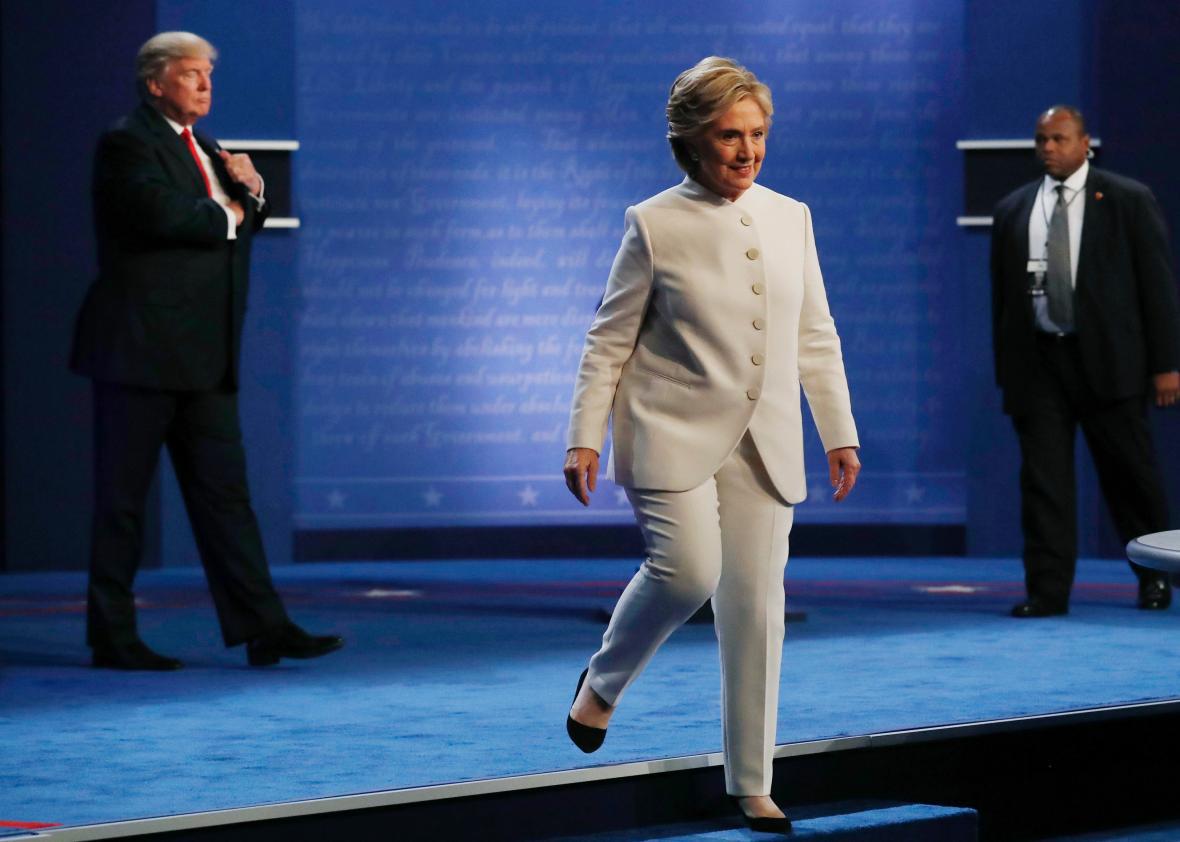Hillary Clinton has lots to be pleased about after Wednesday evening’s presidential debate, which will mainly be remembered as the night Donald Trump refused to say whether he would accept the results of an election, trampling yet another bedrock norm of the American political system. Beyond that, Clinton herself delivered a strong performance. Barring a shocking turn of events, she appears to be on a glide path to the White House.
But I think there’s at least one answer Clinton offered this evening that she’ll come to regret. On three separate occasions, the candidate said she would not “add a penny” to the national debt (she’d used that same phrase before the debate, too). “I pay for everything I’m proposing,” she told moderator Chris Wallace. “I take that very seriously because I do think it’s one of the issues we’ve got to come to grips with.” This is bad economics and bad politics. It may have been her most regrettable moment of the night.
First, the economics. At this moment in history, there is little to no reason why the United States should be worried about its debt load. Over the very, very long term, we might have to do something to keep entitlements from causing our national tab to spiral upward uncontrollably. (That would happen a lot faster if any of the gonzo tax cuts Republicans like Trump have proposed ever came to pass.) But we are not on the precipice of some debt-fueled disaster. And frankly, we’ve been shooting ourselves in the foot by refusing to borrow more during this era of rock-bottom interest rates, which would allow us to finance investments in infrastructure and push the economy back to its full potential for practically nothing. Investors are all but begging the United States and other countries for new bonds. We should oblige them.
Clinton, of course, has a fairly large infrastructure plan, which she hopes will stimulate growth and new jobs. But stimulus works by increasing the deficit and creating new demand. If she pays for her whole plan upfront with tax increases, she may end up blunting some of its positive effects on growth. So, by buying into the debt-phobic Washington consensus that says our borrowing is an existential emergency, she’s undermining her own best laid plans to get the country moving again. Now, it may be the case that the only way a Republican House will ever pass an infrastructure bill is if it’s 100 percent paid for. But that doesn’t change the GDP math.
As for the politics: One problem is that, as of now, Clinton’s claim doesn’t seem to be entirely true. Her plans are mostly paid for through new taxes on the wealthy. But as of September, the Committee for a Responsible Federal Budget still thought that over a decade, her proposals would add an additional $200 billion to the debt, which will grow to about 86 percent of GDP. (To be clear, Clinton isn’t saying she’ll balance the budget. She’s just saying her plans won’t cause the debt to grow any faster.) That would be fine on substance, but Clinton has now boxed herself in with her fiscally prudent rhetoric about not adding a penny to our national tab. And if her programs do end up increasing the debt, I can only assume Republicans will be ready to cut TV spots of her promising not to, accusing her of trashing a campaign vow.
Beyond all that, the penny line is just unnecessary. This election is not being fought over fiscal policy. It’s about groping and whether Donald Trump can be trusted with the nuclear codes. There’s no reason Clinton couldn’t give herself a little wiggle room on this issue. Unless she really is a debt hawk at heart. That, of course, would be a true pity.
